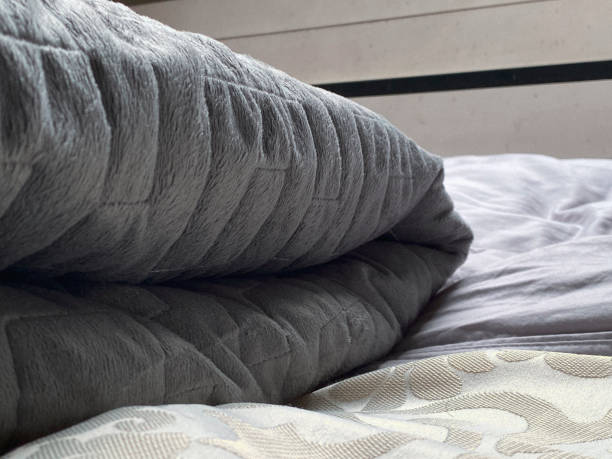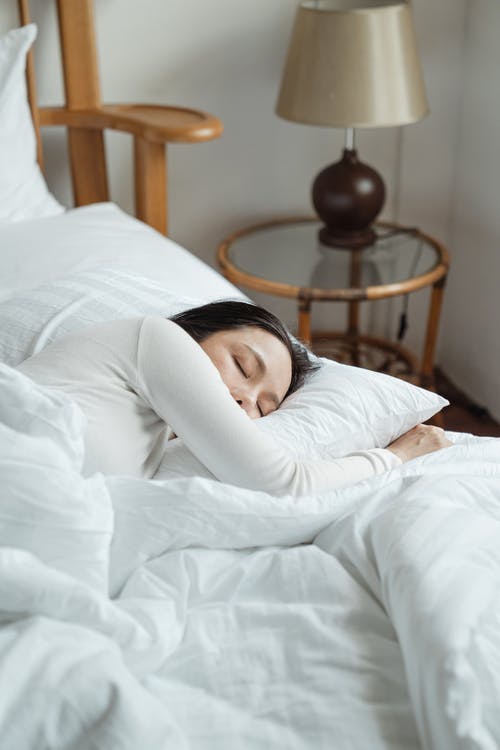Weighted blankets have become a routine side for healthy sleeping habits, relieving stress, and a good reason for many people. Recent research suggests that weighted blankets have benefited individuals with anxiety, insomnia, autism, and many other health conditions.
Let’s explore how weighted blankets work and the benefits and risks of using these therapeutic blankets.
Read our popular article " Blood Oxygen Levels: What You Need to Know"
What are the benefits of using a weighted blanket?
The weight of the weighted blanket is approximately between 5 and 30 pounds. The extra weight of the weighted blanket imitates the techniques of therapeutic known as deep pressure stimulation.
The deep pressure stimulation applies hands’ pressure in relaxing the nervous system.
By doing so, it helps in:
- Relieving pain
- Lessening anxiety
- Improving the mood
With deep pressure stimulation, the pressure should not be from the hands-on.

On the other hand, the same pressure comes from the body wrapped using a weighted blanket. Deep pressure stimulation has shown to be a useful part of different treatments, including massage therapy Trusted Source, and the use of support animals Trusted Source.
Where to find a weighted blankets and how much they cost

There are a handful of companies that specialize in weighted blankets, including:
- Mosaic. It carries a full line of weighted blankets for every age. Mosaic weighted blankets start at roughly $125.
- Gravity. It was awarded the top-rated weighted blanket award in 2019 by Mattress Advisor. Gravity weighted blankets start at around $250.
- SensaCalm. It carries premade and custom weighted blankets. SensaCalm weighted blankets start at roughly $100.
- Layla. It specializes in mattresses and pillows, but they also carry a weighted blanket that starts at around $129.
Who may benefit from a weighted blanket?

Researchers have studied weighted blankets’ effectiveness for various conditions. Although more research is needed, results have so far indicated the following benefits (Parker, 2016):
Autism
One of the symptoms of autism, especially in children, is trouble sleeping. In a crossover study from 2014, researchers investigated weighted blankets’ effectiveness for sleep issues related to autism. The results found there was little improvement in sleep scores from the use of the weighted blanket.
However, both the children and their parents noted they liked the weighted blanket more, despite the lack of improvement.
This is supported by a smaller research study Trusted Source found the positive benefits of deep pressure therapy in some people with autism.

ADHD
Very few studies examine the use of weighted blankets for ADHD, but a similar analysis was performed using weighted vests. In this study, researchers explain that weighted vests have been used in ADHD therapy to improve attention and reduce hyperactive movements.
The study found promising results for participants who used the weighted vest during a continuous performance test. These participants experienced reductions in reducing task, gerund their seats, and present participles. Additionally, research Trusted Source further suggests that a weighted blanket also benefits sleeping issues concerning ADHD.
Anxiety
The primary use of a weighted blanket is to treat anxiety. Recent researchers have enlightened many people that deep pressure stimulation can help in reducing autonomic arousal. The autonomic arousal is responsible for signs and symptoms of fear; they include increased heart rate.
The researchers also explain that lying down may also have helped reduce anxiety for some study participants.
This suggests that using a weighted blanket while lying down may further help reduce anxiety symptoms.

Insomnia and sleep disorders
In the 2004 crossover study on autism and weighted blankets, both the parents and children felt the weighted blankets were beneficial in reducing sleep issues.
In the ADHD study Trusted Source using ball blankets, the weighted blanket helped reduce sleep onset time and nighttime awakenings in study participants. These study results suggest an overall benefit of using weighted blankets to treat sleep disorders.
Osteoarthritis
There are no research studies on the use of weighted blankets for osteoarthritis. However, one study Trusted Source utilizing massage therapy may provide a link.
In this small study, 18 participants with osteoarthritis received massage therapy on their knee for eight weeks.
Study participants noted the massage therapy helped reduce knee pain and improve their quality of life.
Massage therapy applies deep pressure to osteoarthritic joints, so similar benefits may be experienced when using a weighted blanket.

Chronic pain
One of the recommended at-home treatments for chronic pain is massage therapy. In one small study Trusted Source, researchers found that starting with light pressure, later gradually increasing to moderate pressure, and then using deep pressure during massage therapy may reduce pain reflexes in those with chronic pain conditions. This indicates that a weighted blanket’s extra pressure helps keep the legs in a position and reduce pain in chronic pain conditions.
Medical procedures
There may be some benefit to using weighted blankets during medical procedures. A 2016 study experimented with using weighted blankets on participants undergoing wisdom tooth extraction.
The weighted blanket participants experienced lower anxiety symptoms than the control group.
The researchers performed a similar follow-up study on adolescents using a weighted blanket during a molar extraction.
Those results also found less anxiety with the use of a weighted blanket (Russin et al., 2020).

Since medical procedures tend to cause anxiety symptoms like increased heart rate, using weighted blankets may help calm those symptoms.
Are there risks when using a weighted blanket?

From the above discussions on the benefits of weighted blankets, in this section, we are going to discuss some risks of using a weighted blanket. However, according to Löwing et al., (2020), weighted blankets should not be used to wrap small children under the age of 2, increasing the risk of suffocation.
Always consult your pediatrician before trying a weighted blanket.
On the other hand, a weighted blanket may be unfavorable for persons with difficulties in certain health conditions, such as the following:
- Obstructive sleep apnea, which causes disrupted breathing during sleep
- Breathing difficulties during the night.
- A weighted blanket triggers tightness.
Conclusion
This article discussed the weighted blanket, its benefits, and the risks when using them. The benefits of weighted blankets include autism, anxiety, and ADHD. However, they can help reduce stress, improve sleeping troubles, and calming a restless body.
The main risk of a weighted blanket is that it can increase the chances of suffocation among children and cause breathing difficulties to people with health problems.
When choosing a weighted blanket for yourself, find a snug size that’s around 10 percent of your body weight.
References
Löwing, K., Gyllensvärd, M., & Tedroff, K. (2020). Exploring sleep problems in young children with cerebral palsy-A population-based study. European Journal of Paediatric Neurology, 28, 186-192.
Russin, R. T., Studenroth, C. L., Ashbacher, A. L., Russin, T. W., Marras, C. T., & Barr, S. R. (2020). U.S. Patent Application No. 16/212,394.
Parker, E., & Koscinski, C. (2016). The weighted blanket guide: Everything you need to know about weighted blankets and deep pressure for autism, chronic pain, and other conditions. Jessica Kingsley Publishers.
